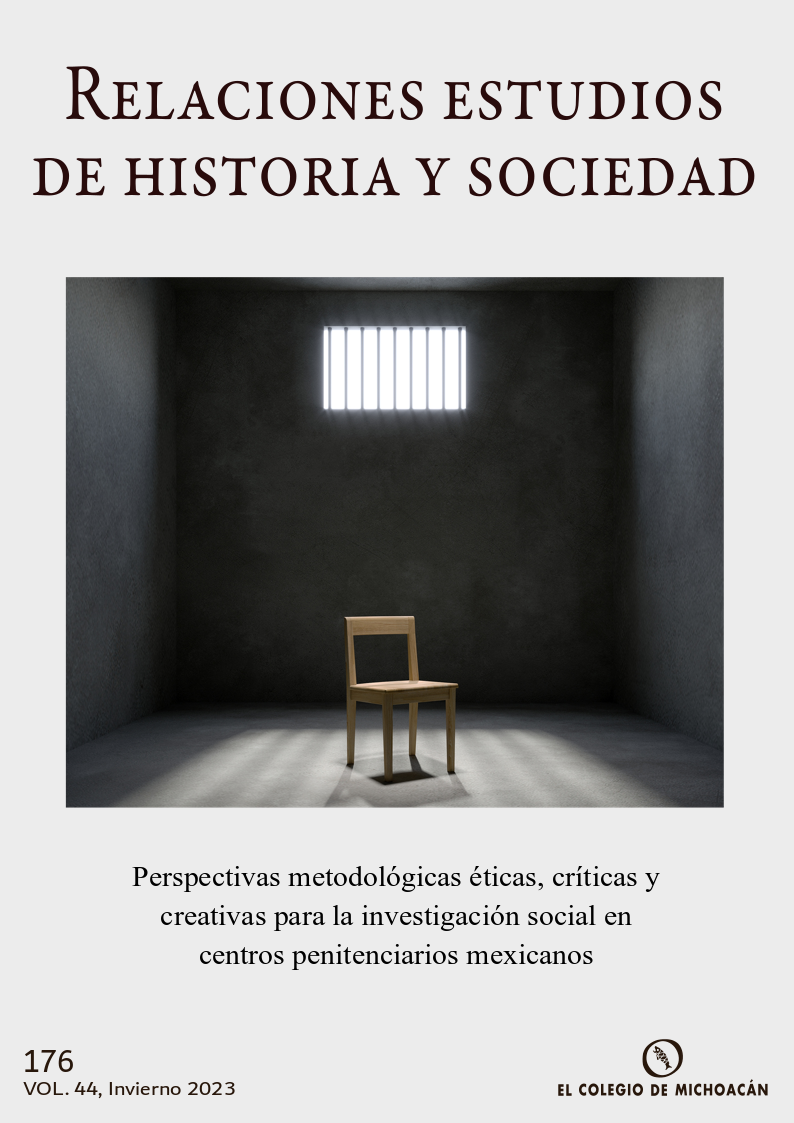Unconventional-multifunctional theater as a strategy for social research with the population confined in penitentiary centers
DOI:
https://doi.org/10.24901/rehs.v44i176.955Keywords:
Prisons, Unconventional-multifunctional theater, Lateral-reflexive-collaborative-creative ethnographyAbstract
The objective of this work is to account for the strategies and challenges of doing social research in prisons. In that same situation, it also seeks to reflect on the giving and receiving during the investigative process in these spaces of confinement. From an anthropological approach, and assuming that the research is a performance, it proposes reflective, lateral, collaborative, and creative ethnography in conjunction with unconventional and multifunctional theater are useful tools in prisons not only to face the challenges of this type of space but also to generate benefits in multiple ways. In short, these methodologies applications allow us to rethink what we give and receive in these contexts and research in general.
References
APA, Z. L., BAI, R. Y., MUKHEREJEE, D. V., HERZIG, C. T. A., KOENIGSMANN, C., LOWY, F. D. y LARSON, E. L. (2012). Challenges and Strategies for Research in Prisons. Public Health Nurs, 29(5), 467-72. https://www.ncbi.nlm.nih.gov/pmc/articles/PMC3694772/
BOAL, A. (1980). Teatro del oprimido 1. Teoría y práctica. Editorial Nueva Imagen.
BRANDERS, Ch. (2017). Théâtre et enfermement: la création collective comme modalité de l’expérience d’enquête en prison. Criminocorpus. Revue hipermedia, Histoire de la justice, des crimes et des peines, (8). https://doi.org/10.4000/criminocorpus.3541
CONNELL, R. (2003). Masculinidades. Universidad Nacional Autónoma de México, Programa Universitario en Estudios de Género.
DIETZ, G. y ÁLVAREZ, A. (2014). Reflexividad, interpretación y colaboración en etnografía: un ejemplo desde la antropología de la educación. En C. Oehmichen Bazán (Ed.), La etnografía y el trabajo de campo en las ciencias sociales (pp. 55-89). Universidad Nacional Autónoma de México.
FERNÁNDEZ, C. (2013). Antecedentes e historia del teatro comunitario argentino contemporáneo. Los inicios de un movimiento. Aisthesis, (54), 147-174.
GUTMANN, M. (2016 [2007]). La domesticación de los deseos naturales de los hombres en Oaxaca. En M. Gutmann, Por mis pistolas: sexualidad, anticoncepción y sida en México (pp. 13-42). Siglo XXI.
KALINSKI, B. (2004). La metodología de investigación antropológica en ambientes criminógenos. Un estudio de caso. Gazeta de Antropología, (20). http://www.ugr.es/~pwlac/G20_36Beatriz_Kalinsky.html
LEY NACIONAL DE EJECUCIÓN PENAL de 2016. Se expide la Ley Nacional de Ejecución Penal; se adicionan las fracciones XXXV, XXXVI Y XXXVII y un quinto párrafo, y se reforma el tercer párrafo del artículo 225 del Código Penal Federal. 16 de junio de 2016. http://www.diputados.gob.mx/LeyesBiblio/pdf/LNEP_090518.pdf
MOTOS, T. y FERRANDIS, D. (2015). Teatro aplicado. Teatro del oprimido, teatro Playback, dramaterapia. Octaedro.
PARRINI, R. (2018). Obscuras máquinas del devenir: diferencia, deseo y corporalidad. En R. Parrini, Deseografías. Una antropología del deseo (pp. 231-297). Casa abierta al tiempo, Universidad Autónoma Metropolitana, Unidad Iztapalapa, Unidad Xochimilco.
PRIETO, A. S. y TORIZ, M. P. (2015). Performance: entre el teatro y la antropología. Diario de Campo. Estudios del performance: quiebres e itinerarios, 2(6-7), 22-31.
ROSTAING, C. (2017). Quelques ficelles de sociologie carcérale. Criminocorpus. Revue hipermedia, Histoire de la justice, des crimes et des peines, (8). http://journals.openedition.org/criminocorpus/3552
THOMPSON, J. (2004). From the Stocks to the Stage: Prison Theatre and the Theatre of Prison. En M. Balfour (Ed.), Theatre in prison. Theory and practice (pp. 57-76). Intellect.
VARGAS, L. y BUSTILLOS, G. (1990). Técnicas Participativas para la Educación Popular. Centro de Investigación y Desarrollo de la Educación. https://docenteslibresmdq.files.wordpress.com/2014/04/cide-tecnicas-participativas-para-la-educacion-popular-ilustradas.pdf
Published
Issue
Section
License
Copyright (c) 2023 María Concepción Rodríguez Ceja

This work is licensed under a Creative Commons Attribution-NonCommercial 4.0 International License.
Derecho de los autoresDe acuerdo con la legislación vigente de Derechos de Autor, la revista Relaciones Estudios de Historia y Sociedad reconoce y respeta el derecho moral de los autores, así como la titularidad del derecho patrimonial, el cual será transferido –de forma no exclusiva– a la revista para permitir su difusión legal en Acceso Abierto.
Los autores pueden realizar otros acuerdos contractuales independientes y adicionales para la distribución no exclusiva de la versión del artículo publicado (por ejemplo, incluirlo en un repositorio institucional o darlo a conocer en otros medios en papel o electrónicos), siempre que se indique clara y explícitamente que el trabajo se publicó por primera vez en la revista Relaciones Estudios de Historia y Sociedad.
Para todo lo anterior, los autores deben remitir la carta de transmisión de derechos patrimoniales de la primera publicación, debidamente requisitada y firmado. Este formato debe ser remitido en PDF a través de la plataforma OJS.
Derechos de los lectores
Bajo los principios de Acceso Abierto los lectores la revista tienen derecho a la libre lectura, impresión y distribución de los contenidos de la revista por cualquier medio, de manera inmediata a su publicación en línea. El único requisito para esto es que siempre se indique clara y explícitamente que el trabajo se publicó por primera vez en la revista Relaciones Estudios de Historia y Sociedad y se cite de manera correcta la fuente y el DOI correspondiente.















